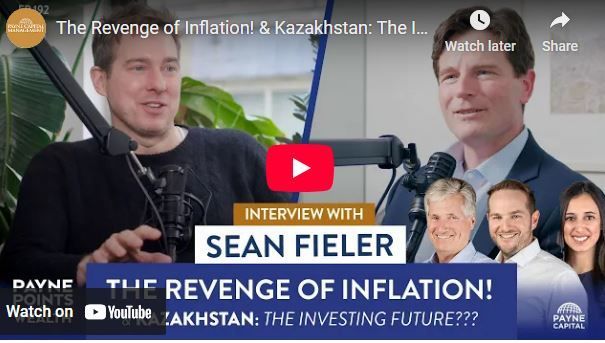Equinox Partners, L.P. - Q1 2022 Letter
Dear Partners and Friends,
PERFORMANCE & PORTFOLIO
Equinox Partners gained +32.4% in the first quarter of 2022.
Our E&P holdings accounted for almost 90% of our gains during the quarter. Our gold miners, fixed income shorts and equity shorts were small, positive contributors, while our operating companies declined.
Visit our performance page to view the Equinox Partners, L.P. fund summary in more detail.[1]
INVESTING THROUGH A GLOBAL REALIGNMENT
Two news stories dominated the first quarter of 2022: Russia’s invasion of Ukraine and inflation. How these two events are interpreted should have an overwhelming influence on how investors allocate capital. If inflation and the war in Ukraine are disruptions that markets will eventually move beyond, then investors need not necessarily change how they invest. If, however, these two events are surface expressions of larger structural changes in geopolitics and economics, then investors need to prepare for a future that does not resemble the recent past.
The mainstream financial press is firmly in the temporary disruption camp. The thinking goes that while the war and inflation are serious threats to capital markets that need to be addressed, they will not force a restructuring of the global financial architecture. The Financial Times has been at pains to point out that the dollar-centric global financial system remains stable. On April 5th, the editorial board of the Financial Times concluded that “The US dollar’s status is safe for now.” The Wall Street Journal has taken a slightly different tact, publishing a series of pieces calling for tighter monetary policy and fiscal policy. On February 23rd, the Journal published Steve Hanke’s and Nicholas Hanlon’s piece that criticized only the past two years of monetary policy: “The money supply as measured by M2, which is the Fed’s broadest measure of money in the economy, has been growing at record rates—with 39.9% cumulative growth since February 2020.” And, on March 3rd, the Journal published Thomas Sargent’s and William Silber’s argument that fiscal deficits need to be controlled in order to give the Federal Reserve a better chance of controlling inflation: “Without decreasing the budget deficit, combating inflation with monetary policy is like entering a heavyweight championship competition with one hand tied behind your back.”
For self-evident political reasons, we expected Secretary Yellen to stick with the same talking points as the Financial Times. She cannot very well call for tighter fiscal policy while she is championing Build Back Better, nor can she criticize the policies of her successors at the Federal Reserve. Her lane is the boring defense of the status quo—all of which makes her speech at the Atlantic Council on April 13th particularly noteworthy. While Secretary Yellen did offer a de rigueur defense of the dollar (“[I]t will be a long time, if ever, before the dollar is replaced as a key reserve currency in the global economy”), she also called for a fundamental reordering of the global financial architecture. Secretary Yellen’s overarching point was clear enough that the reporter conducting the Q&A penned an op-ed in the Financial Times the following week entitled, “It’s time for a new Bretton Woods.” This conclusion follows directly from Secretary Yellen’s closing remarks at the Atlantic Council on April 13th:
“Treasury officials began crafting proposals for the IMF, the World Bank, and the post-war international financial architecture in 1941, as World War II raged in Europe. Three years later, in the opening to the Bretton Woods Conference—occurring as the Allied invasion of Normandy was still underway—President Roosevelt said, “It is fitting that even while the war for liberation is at its peak, we should gather to take counsel with one another respecting the shape of the future which we are to win.” As then, we ought not wait for a new normal. We should begin to shape a better future today.”
- Secretary of the Treasury, Janet Yellen, April 13, 2022
Having served as the Chair of the White House Council of Economic Advisors, President of the San Francisco Fed, Vice Chair of the Fed, Chair of the Fed, and now as Secretary of the Treasury, no one is more responsible for the status quo than Secretary Yellen. As such, what she is saying is not significant because it is insightful. It is significant because it presumably reflects an appetite on the part of both the Fed and the Treasury to make significant changes to the global financial system.
Specifically, Secretary Yellen is proposing the creation of an American supply chain and trading block consisting of exclusively of friendly countries. Friend-shoring, she calls it. Lest there be no doubt, this policy would exclude unfriendly countries from our supply chain. Neutrality is not an option. Every country will have to choose sides:
“[L]et me now say a few words to those countries who are currently sitting on the fence, perhaps seeing an opportunity to gain by preserving their relationship with Russia and backfilling the void left by others. Such motivations are short-sighted. The future of our international order, both for peaceful security and economic prosperity, is at stake.”
- Secretary of the Treasury, Janet Yellen, April 13, 2022
Our takeaway from Secretary Yellen’s speech is that the deflationary era of free-flowing goods, services, and capital is sunsetting. Not only is Russia going to be shunned for the foreseeable future, but trade with countries that won’t take sides will be more complicated and more political. The likely outcome of this policy is not a world united against Russia, but a world economic order that begins to reverse the deflationary globalization of the past four decades.
To our mind it is fitting that this watershed moment in the free flow of goods and capital is being advanced by Secretary Yellen. After all, it was her tenure as Federal Reserve chair that normalized radical monetary policy during an economic expansion and created many of the unmanageable imbalances with which the world economy is currently grappling. If her proposal to exclude unfriendly nations from global trade and capital flows is even partially implemented, the results will likely prove equally significant to the world’s financial order. We recommend that everyone invest accordingly.
A REALITY CHECK FOR THE ESG MOVEMENT
The ESG movement is in crisis. Russia’s invasion of Ukraine has called into question the wisdom of the movement’s policy centerpiece: restricting oil and gas investment. In addition to causing hydrocarbon shortages and strengthening OPEC and Russia, the coordinated effort to depress oil and gas production is potentially a violation of American antitrust law. We expect this combination of bad policy and legal risk will prove too much for the profit-minded supporters of ESG and the movement will lose much of the support it currently enjoys.
ESG standards have always been top-down and coercive rather than grassroots and democratic for a simple reason: suppressing oil and gas consumption is unpopular. Given this political constraint, the ESG movement has eschewed straightforward hydrocarbon taxation and focused on undemocratic efforts to restrict the supply of oil and gas via elite institutions, specifically corporate boards. Regardless of our opinion about these tactics, this board-focused strategy has delivered spectacular results as best exemplified by the movement’s victory over ExxonMobile last year.
It is, however, no coincidence that the ESG movement’s string of successes in the boardroom coincided with years of depressed energy prices. ExxonMobil’s board, for instance, only succumbed to the ESG onslaught after posting a $22 billion loss in 2020. Given the persistently low energy prices at the time of the campaign targeting ExxonMobil, a painless transition away from oil and gas seemed possible in the eyes of capital markets. ExxonMobil’s stock actually rallied on the news that the company’s largest shareholders had forced three directors on to the board to ensure the company’s eventual divestment from hydrocarbons.
Following Russia’s invasion of Ukraine, the ESG movement’s attack on ExxonMobil now looks imprudent. Not only are hydrocarbon investments significantly more profitable than they were last summer, but the strategy of deliberately underinvesting in oil and gas production is obviously jeopardizing the world’s energy security. While the ESG-influenced shareholders of ExxonMobile couldn’t have known that Russia would invade Ukraine, they should have known that eventual tightness in the oil and gas market was the likely, if not inevitable, outcome of long-term underinvestment.
A decarbonization strategy that does not threaten the world’s energy security would have done the opposite of what the ESG movement has done, i.e. reduce demand while continuing to invest in exploration and production outside of OPEC and Russia. By boosting our energy exports and taking share from OPEC and Russia, America could have achieved a real geopolitical advantage. The problem with this strategy is that it concedes the obvious truth that global fossil fuel consumption is neither declining nor about to decline. Given this unpalatable alternative, the ESG movement opted for the top-down, undemocratic route instead.
Unfortunately for the ESG movement, the coercive tactics they’ve employed to suppress the supply of oil and gas are possibly a violation of America antitrust law. The centerpiece of the ESG effort involves “the collusion of owners of capital to restrict the supply of a good or service”. Regardless of the colluding parties’ motivations, this is a textbook definition of an antitrust violation.
Given this legal vulnerability, it was only a matter of time until action was taken. Last year, Mark Brnovich, the Attorney General of Arizona, announced that he had subpoenaed the records of a large money manager in relation to an anti-trust investigation of their ESG practices. Even if the ESG movement is only engaged in a fraction of the activities that Climate Action 100+ takes credit for on its website, Attorney General Brnovich should not have to look too hard to find evidence of coordination and coercion.
The notion that ESG proponents are colluding solely to make the world a better place strikes us as neither completely true nor a particularly robust legally argument. No matter how noble the ESG movement’s intentions, the movement’s proponents are profiting from their efforts. First, to the extent that members of Climate Action 100+ continue to invest in oil and gas companies, they are benefiting from the higher profits that have resulted from their effort to restrict the supply of oil and gas. Second, by excluding non-ESG money managers from bidding on certain contracts, the members of Climate Action 100+ are reducing the competition they face in the marketplace.
While the impulse to do good which underlies the mainstream support for the ESG movement is not going away, the coercive and undemocratic tactics that characterize the push for decarbonization have likely peaked. We hope that as the ESG movement pivots, its proponents will recognize that prudent capital allocation decisions cannot be reduced to a reporting and box-checking exercise. For our part, we will continue to focus on the difficult, company-specific work of ensuring that our companies are operating to the highest ethical standards while being good stewards of their shareholders’ capital.
Sincerely,
Equinox Partners Investment Management
[1] Sector exposures shown as a percentage of 3.31.22 pre-redemption AUM. Performance contribution is derived in U.S. dollars, gross of fees and fund expenses. Interest rate swaps notional value and P&L are included in Fixed Income. P&L on cash is excluded from the table as are market value exposures for derivatives. Unless otherwise noted, all company data is derived from internal analysis, company presentations, or Bloomberg. All values are as of 12.31.21 unless otherwise noted.
Endnote: Unless otherwise noted, all company-specific data derived from internal analysis, company presentations, Bloomberg, or independent sources. Values as of 3.31.22, unless otherwise noted.
This document is not an offer to sell or the solicitation of an offer to buy interests in any product and is being provided for informational purposes only and should not be relied upon as legal, tax or investment advice. An offering of interests will be made only by means of a confidential private offering memorandum and only to qualified investors in jurisdictions where permitted by law.
An investment is speculative and involves a high degree of risk. There is no secondary market for the investor’s interests and none is expected to develop and there may be restrictions on transferring interests. The Investment Advisor has total trading authority. Performance results are net of fees and expenses and reflect the reinvestment of dividends, interest and other earnings.
Prior performance is not necessarily indicative of future results. Any investment in a fund involves the risk of loss. Performance can be volatile and an investor could lose all or a substantial portion of his or her investment.
The information presented herein is current only as of the particular dates specified for such information, and is subject to change in future periods without notic








Equinox Partners Investment Management, LLC | Information as of 12.31.24 unless noted | *SEC registration does not imply a certain level of skill or training
Equinox Partners Investment Management, LLC | Site by Fix8

